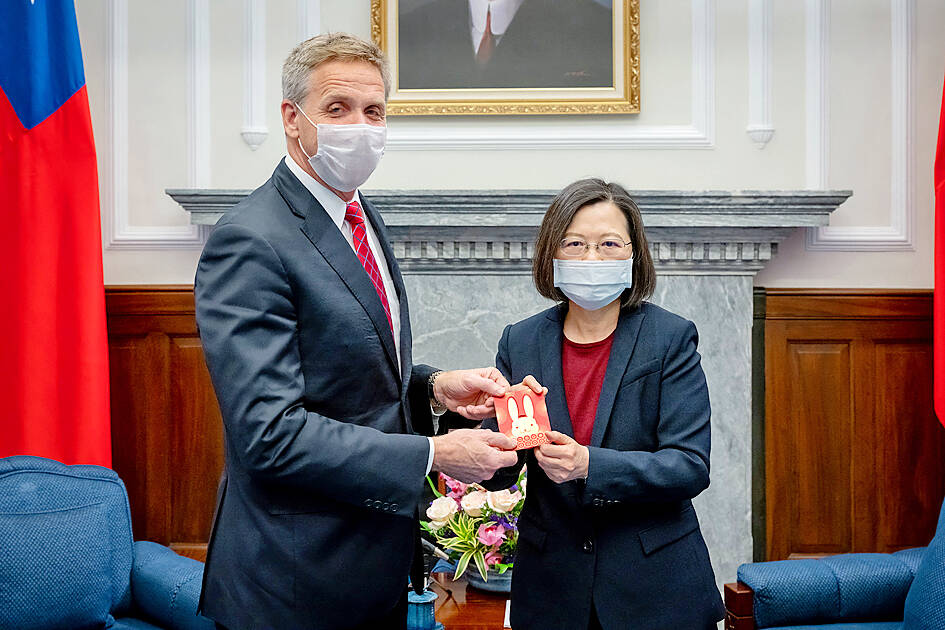The US and Taiwan can deepen their relations on many fronts, former head of the US Indo-Pacific Command Philip Davidson said yesterday while visiting President Tsai Ing-wen (蔡英文) at the Presidential Office.
Davidson is leading a six-member delegation from the National Bureau of Asian Research, a US-based think tank. They arrived on Monday and are scheduled to depart tomorrow.
Tsai met with the delegation yesterday morning, welcoming the organization on its first visit to Taiwan since the start of the COVID-19 pandemic, the office said in a statement.

Photo: Makoto Lin, EPA-EFE
She thanked Davidson, a retired admiral, for paying close attention to matters regarding the Taiwan Strait during his tenure from 2018 to 2021, and calling on the US government to continue his efforts after retiring, the statement said.
Taiwan must boost its defense capabilities in the face of authoritarian expansion to ensure national security, and safeguard the values of democracy and freedom, Tsai said in the statement.
“We have the faith, confidence and ability” to protect the country, Tsai said, adding that Taiwan would continue to work with the US and other like-minded partners.
Taiwan and the US continue to facilitate military exchanges, economic cooperation and trade partnerships, Tsai said.
The latest meeting of the US-Taiwan Initiative on 21st-Century Trade last month facilitated trade with convenient customs clearance protocols and bilateral platforms, she said.
Taiwan is looking forward to cooperating more closely with the US in supply chain matters, telecommunications security, science and technology, and other areas, she added.
Taiwan is a force for good that maintains regional peace and protects democracy and freedom, Tsai said, adding that the nation contributes to the prosperity of the region.
Davidson thanked Tsai for the warm welcome and said that he is honored to visit Taiwan for the first time.
He had in-depth discussions with US and Taiwanese bodies, along with think tanks in Taipei, he said.
Discussions since the delegation’s arrival focused on Taiwan’s democratic progress and civil society, as well as China’s actions against Taiwan, he said.
Taiwan has robust infrastructure and industrial development, he said, adding that he has found Taiwanese to be very friendly.
Prior to his arrival, Davidson was in Japan, where he clarified a remark he made in 2021 that China might attack Taiwan in abut 2027, saying that such a move would not necessarily manifest as an invasion of Taiwan proper.
“In my mind, that can be many lesser things than an all-out invasion. One of those would be the threats to outer islands, and I think it’s a grave security concern,” he said.

Taiwan is projected to lose a working-age population of about 6.67 million people in two waves of retirement in the coming years, as the nation confronts accelerating demographic decline and a shortage of younger workers to take their place, the Ministry of the Interior said. Taiwan experienced its largest baby boom between 1958 and 1966, when the population grew by 3.78 million, followed by a second surge of 2.89 million between 1976 and 1982, ministry data showed. In 2023, the first of those baby boom generations — those born in the late 1950s and early 1960s — began to enter retirement, triggering

ECONOMIC BOOST: Should the more than 23 million people eligible for the NT$10,000 handouts spend them the same way as in 2023, GDP could rise 0.5 percent, an official said Universal cash handouts of NT$10,000 (US$330) are to be disbursed late next month at the earliest — including to permanent residents and foreign residents married to Taiwanese — pending legislative approval, the Ministry of Finance said yesterday. The Executive Yuan yesterday approved the Special Act for Strengthening Economic, Social and National Security Resilience in Response to International Circumstances (因應國際情勢強化經濟社會及民生國安韌性特別條例). The NT$550 billion special budget includes NT$236 billion for the cash handouts, plus an additional NT$20 billion set aside as reserve funds, expected to be used to support industries. Handouts might begin one month after the bill is promulgated and would be completed within

NO CHANGE: The TRA makes clear that the US does not consider the status of Taiwan to have been determined by WWII-era documents, a former AIT deputy director said The American Institute in Taiwan’s (AIT) comments that World War-II era documents do not determine Taiwan’s political status accurately conveyed the US’ stance, the US Department of State said. An AIT spokesperson on Saturday said that a Chinese official mischaracterized World War II-era documents as stating that Taiwan was ceded to the China. The remarks from the US’ de facto embassy in Taiwan drew criticism from the Ma Ying-jeou Foundation, whose director said the comments put Taiwan in danger. The Chinese-language United Daily News yesterday reported that a US State Department spokesperson confirmed the AIT’s position. They added that the US would continue to

The National Development Council (NDC) yesterday unveiled details of new regulations that ease restrictions on foreigners working or living in Taiwan, as part of a bid to attract skilled workers from abroad. The regulations, which could go into effect in the first quarter of next year, stem from amendments to the Act for the Recruitment and Employment of Foreign Professionals (外國專業人才延攬及僱用法) passed by lawmakers on Aug. 29. Students categorized as “overseas compatriots” would be allowed to stay and work in Taiwan in the two years after their graduation without obtaining additional permits, doing away with the evaluation process that is currently required,